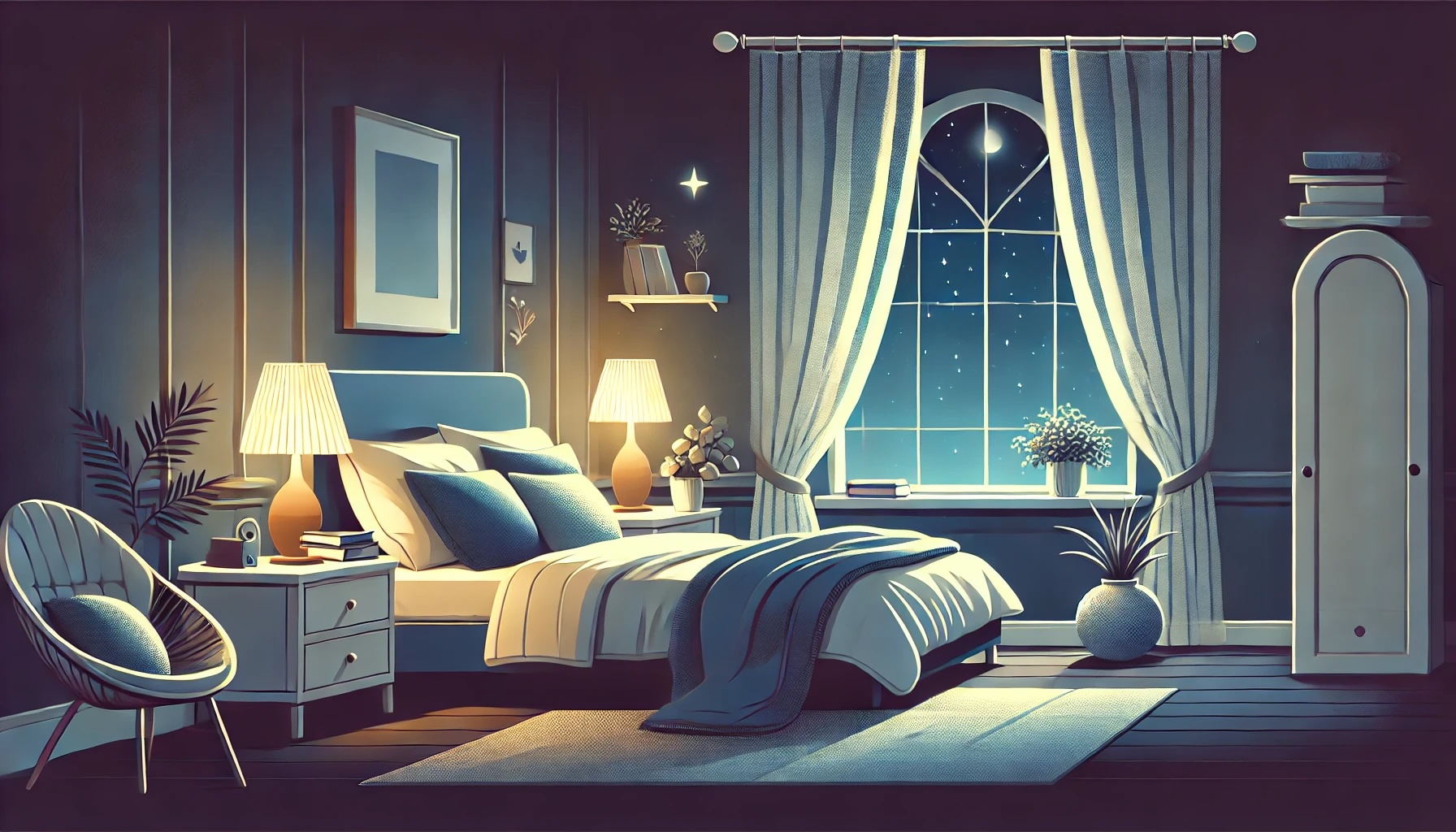Introduction
Insomnia is a common problem that affects millions of people. It can make it hard to fall asleep, stay asleep, or get enough rest. Over time, poor sleep can lead to issues like fatigue, mood swings, and reduced focus. If left untreated, it can also increase the risk of depression, high blood pressure, and heart disease.
The good news is that you can take simple steps to improve your sleep. This article shares easy-to-follow advice to help you fall asleep faster and enjoy better rest.
1. What Causes Insomnia?
Understanding the reasons behind your insomnia can help you find the right solutions. Here are some common causes:
Psychological Factors
• Stress and Anxiety: Work, family, or financial stress can keep your mind active and make it hard to relax at night.
• Depression: If you feel down or hopeless, it may disrupt your sleep patterns.
Lifestyle Choices
• Irregular Sleep Schedule: Going to bed and waking up at different times can confuse your body’s internal clock.
• Too Much Screen Time: Using phones or laptops late at night can delay sleep because blue light blocks melatonin, the sleep hormone.
Health Problems
• Chronic Pain: Conditions like arthritis or back pain can hinder deep sleep.
• Sleep Apnea: This condition causes you to stop breathing briefly during the night, leading to frequent wake-ups.
Environment
• Noise: Sounds from traffic, neighbors, or pets can disturb your sleep.
• Light: Bright lights or poorly covered windows may also prevent restful sleep.
2. How Does Sleep Work?
Your sleep is controlled by two main systems:
• Circadian Rhythm: This is your body’s internal clock, which helps you feel sleepy at night and alert during the day. A regular routine keeps it on track.
• Sleep Drive: The longer you stay awake, the more your body needs sleep. Daytime activities, like exercise, can build up this “sleep pressure.”
3. Easy Tips to Fall Asleep Faster
Stick to a Regular Schedule
Go to bed and wake up at the same time every day, even on weekends.
This helps your body recognize when it’s time to sleep.
Create a Sleep-Friendly Bedroom
Keep your bedroom cool, ideally between 60–67°F (16–20°C).
Use blackout curtains or a sleep mask to block out light.
Consider earplugs or a white noise machine to mask disruptive sounds.
Watch Your Evening Habits
Avoid caffeine after 2 PM to prevent its stimulating effects.
Limit alcohol consumption, as it disrupts deep sleep.
Avoid heavy or spicy meals before bed to prevent discomfort.
Relax Before Bed
Practice deep breathing to calm your mind and body.
Take a warm bath 1–2 hours before bed to lower your body temperature.
Read a calming book instead of watching TV or scrolling on your phone.
Turn Off Screens
Stop using phones, tablets, and computers at least an hour before bed.
If necessary, use night mode or blue-light-blocking glasses.
Stay Active During the Day
Exercise regularly to build up your sleep drive, but avoid intense workouts close to bedtime.
Use Natural Sleep Aids
Consider melatonin supplements for short-term sleep regulation.
Try herbal teas like chamomile or valerian root to relax.
Use aromatherapy with lavender to create a calming atmosphere.
4. Long-Term Solutions for Better Sleep
Build Healthy Daytime Habits
Spend time in natural sunlight during the morning to reset your circadian rhythm.
Limit naps to 20 minutes or less to avoid disrupting your nighttime sleep.
Manage Stress
Explore Cognitive Behavioral Therapy for Insomnia (CBT-I) to address negative sleep thoughts.
Plan your day to reduce last-minute stress and anxiety.
Avoid Overusing Sleep Medications
Use sleep aids only under medical supervision and for short-term relief.
Focus on building lasting habits for sustainable sleep improvements.
5. Common Sleep Problems and Quick Fixes
Difficulty Falling Asleep
Stress or overthinking before bed often causes this.
Try relaxation techniques like deep breathing, meditation, or listening to calming music.
Waking Up Often
Noise, health issues, or uncomfortable bedding might be the problem.
Use earplugs, address health concerns, and invest in a supportive mattress and pillow.
Waking Up Too Early
Your circadian rhythm or stress could be the culprit.
Avoid early morning light exposure and adjust your bedtime routine.
6. Tips to Prevent Insomnia
Avoid stimulating activities, like intense work or TV shows, before bed.
Don’t force yourself to sleep. If you’re still awake after 20 minutes, get up and do something relaxing.
Use your bed only for sleeping or resting—not for working or scrolling on your phone.
Reward yourself for maintaining healthy habits, like a relaxing spa night or a morning walk.
Conclusion
Insomnia doesn’t have to control your life. By using these simple, science-backed tips, you can fall asleep faster and wake up feeling refreshed. Building better sleep habits takes time, but with persistence, you’ll notice significant improvements. Start small, stick with it, and enjoy the benefits of restful sleep.



















